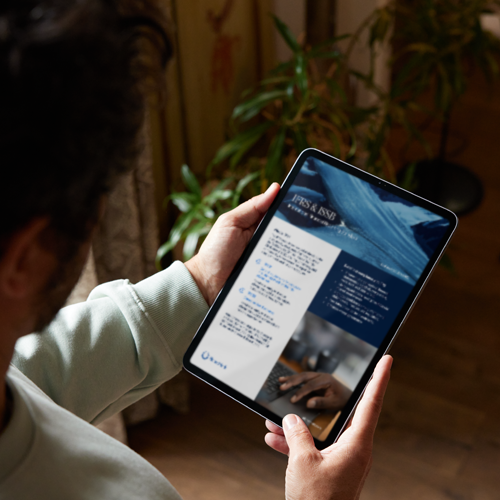POLICY
Adopt the IFRS Sustainability Disclosure Standards
MAKE IFRS S1 AND S2 DISCLOSURES WITH PLANET MARK
The IFRS Sustainability Disclosure Standards require in-scope organisations to report on sustainability and climate-related risks and opportunities. Developed by the International Sustainability Standards Board (ISSB), they aim to provide investors with credible data about an organisation’s sustainability-related risks.
The IFRS Sustainability Disclosure Standards include two sets of requirements, IFRS S1 and IFRS S2. These replace the previous Taskforce for Climate-related Financial Disclosures (TCFD) and are quickly becoming global governments’ blueprint for sustainability reporting legislation.
Keep reading to learn more about producing IFRS S1 and S2 disclosures, and how Planet Mark can help.
IFRS S1 vs IFRS S2
Organisations need to adopt both S1 and S2 to comply with the ISSB’s IFRS Sustainability Disclosure Standards. Here’s how they differ:
IFRS S1 – General Requirements for Disclosure of Sustainability-related Financial Information. This lays out requirements for organisations to disclose their sustainability-related risks and opportunities. Specifically, the risks and opportunities that could affect how investors and creditors provide resources to them, such as their cash flow or access to finance.
IFRS S2 – Climate-related Disclosures. This lays out the requirements for organisations to disclose information about the climate-related risks and opportunities that impact their strategy, business model, and financial performance.
To learn more about the two sets of requirements and what they mean for your organisation, don’t hesitate to get in touch.
Who needs to adopt the IFRS sustainability standards?
The implementation of the IFRS Sustainability Disclosure Standards varies across jurisdictions. However, the standards typically apply to:
- Publicly listed organisations
- Large private organisations
- Accountants and auditors
The UK is currently adopting the standards into legislation, with the proposed UK Sustainability Reporting Standards (SRS) having just been released for consultation. When introduced, financially regulated companies in the UK will need to meet new legal requirements.
Your organisation can also align with the IFRS Sustainability Disclosure Standards voluntarily. This is an effective way to build confidence among investors, and to adopt reporting best practice before the UK formalises its legislation.
Track your disclosure responsibilities with our free tool
From IFRS to CSRD – which sustainability reporting requirements do you need to meet? Find out with our free Carbon Policy Tracker.
How can Planet Mark help?
We can help your organisation to make IFRS-compliant disclosures with our annual membership solution, the Net Zero Certification Programme.
Guiding you through four certified milestones, we can help you to understand your sustainability journey, reduce sustainability-related risks across your organisation, and make credible disclosures. Ultimately, we’ll guide you to achieve net zero, so that you can stay resilient in the face of any climate-related challenges.
To support your IFRS sustainability disclosures, we can help you to:
1. Measure and understand your environmental risks and opportunities
We can measure your Scopes 1, 2, and 3 emissions to help you identify the carbon hotspots that could cause organisational risk.
2. Develop a TPT-aligned Transition Plan for IFRS 2
We can help you to develop and share your Transition Plan in line with the Transition Plan Taskforce’s Disclosure Framework. This will be a comprehensive strategy for reducing your carbon emissions to meet your net zero targets.
3. Report on your sustainability journey with credibility and confidence
We can help you to gather the necessary data and evidence needed to report on your climate action in line with the IFRS Sustainability Disclosure Standards.
Prepare for IFRS reporting with Planet Mark
We can help to future-proof your organisation’s legislative position, reputation, and much more. Explore our carbon measurement and reduction services to learn how.
Insights for your reporting journey
The Business Case for Sustainable Reporting.
Comparing ESG Reporting to Different Frameworks
Operational vs financed emissions – how to bring them together

Become a force for good
Book a free, 30-minute consultation to explore your sustainability goals and how we can help you achieve them.

